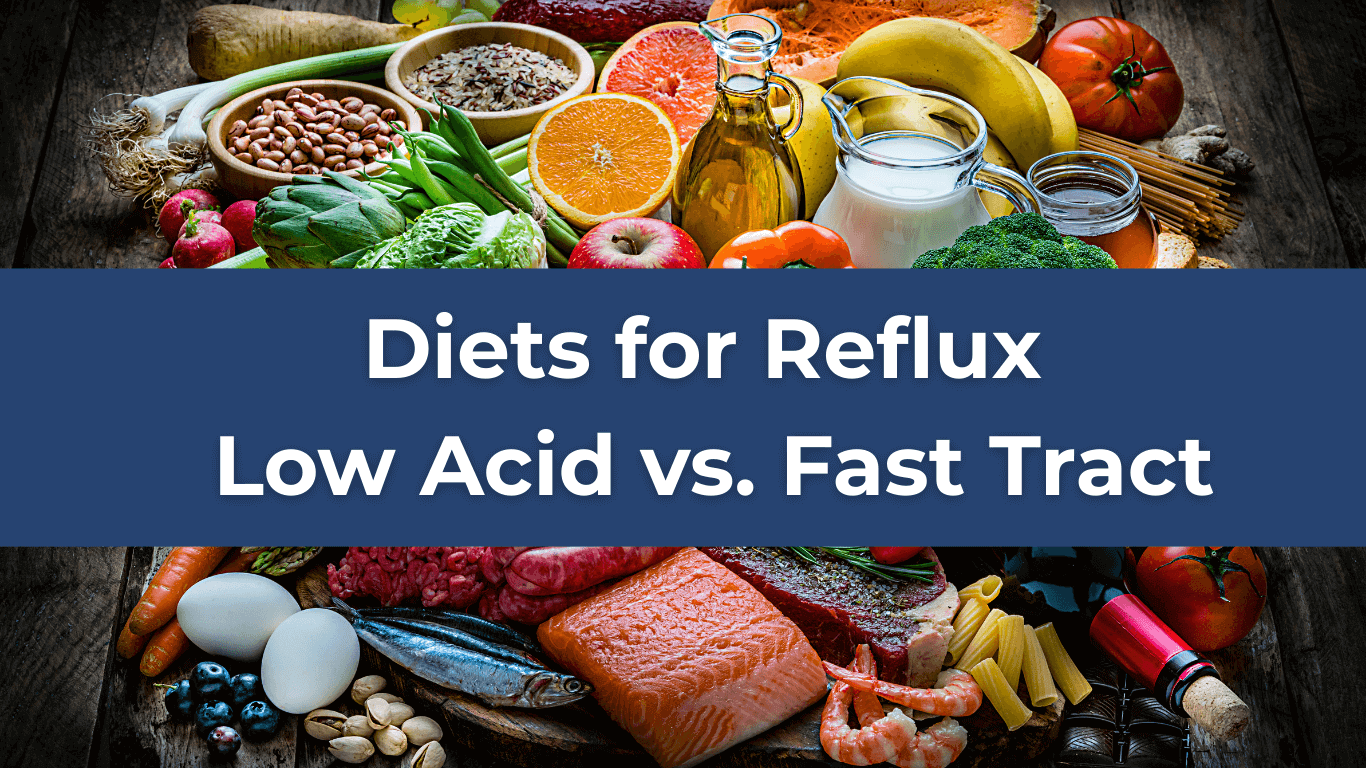Chronic Reflux and Its Impact on Health
Chronic reflux can contribute to a wide range of digestive and related health problems, including:
-
GERD (Gastroesophageal Reflux Disease)
-
LPR (Laryngopharyngeal Reflux)
-
Laryngitis
-
Asthma
-
Esophagitis
-
Esophageal ulcers
-
Esophageal strictures
-
Barrett’s esophagus
-
Esophageal cancer
-
Dental problems (tooth decay, sensitivity)
-
And more
Despite these serious complications, the most common treatment—proton pump inhibitors (PPIs)—only mask symptoms. They do not stop reflux from occurring.
In fact, stomach acid is critical to health.¹ Suppressing it can interfere with digestion, nutrient absorption, and immune defense. Additionally, PPIs have not been shown to outperform placebo for LPR, according to a 2008 randomized trial² and a 2016 meta-analysis.³
So, What’s the Solution?
There are three primary dietary approaches used to address reflux:
-
Trigger Food Diet
-
Low-Acid Diet
-
Fast Tract Diet
Trigger Food Diet
This traditional strategy eliminates common reflux triggers, such as chocolate, caffeine, citrus, alcohol, and spicy foods. However, this approach was debunked by a systematic review of lifestyle modifications for GERD.⁴
Low-Acid Diet
The low-acid approach focuses on the stomach enzyme pepsin, which helps digest protein. When it refluxes into the throat and surrounding tissue, its presence can become inflammatory.
Because this enzyme is only active at an acidic pH, the strategy is to avoid acidic foods such as:
-
Tomatoes
-
Vinegar
-
Citrus
-
Fermented/preserved foods
-
Coffee, soda, and other acidic beverages
This is because these foods might activate the pepsin.
While the low-acid approach makes rational sense, it deals with reflux after the fact.
Reflux also contains acid, bile, other enzymes, and bacteria, making the picture even more complicated. And these elements have to be addressed outside of the low-acid approach.
The Fast Tract Diet (FTD)
The Fast Tract Diet (FTD) is designed to stop reflux itself by systematically limiting the full spectrum of hard-to-digest fermentable carbohydrates.
In addition, FTD includes root cause analysis and behavioral modification, which aim to address a variety of root causes and improve digestion.
The science behind FTD challenges the traditional cause of reflux head-on, which is believed to be that the LES (lower esophageal sphincter) becomes weak or relaxes at the wrong time.
Instead, reflux is caused by poor digestion of carbohydrates, which feeds blooms of gas-producing gut bacteria. The well-fed bacteria produce copious amounts of gas in the intestines, eventually reaching the stomach and the pressure forces the LES to open.
It’s like Mentos in a Coke bottle.
Just 30 grams of unabsorbed carbs can lead to over 10 liters of hydrogen gas in the intestines.⁵
FTD uses a quantitative system called Fermentation Potential (FP) to reduce these problematic carbs systematically. Alongside this, the program incorporates:
-
✅ Root cause analysis
-
✅ Behavioral modification
-
✅ Personalized supplemental support
How to Begin the Fast Tract Diet
📘 Read the Book
Start with Fast Tract Digestion: Heartburn for the science and step-by-step implementation.
📱 Use the App
The Fast Tract Diet App helps you track FP points, monitor symptoms, and stay on plan.
📞 Get Personalized Help for Lasting Relief and Recovery
Call us at (844) 495-1151 (U.S.) — Monday–Friday, 8:30 AM to 5:00 PM ET.
References
-
Stomach acid, primarily hydrochloric acid (HCl), plays several crucial roles in digestion and overall gastrointestinal health: Digesting proteins, killing harmful microorganisms, activating digestive enzymes, facilitating nutrient absorption, regulating gastric emptying, maintaining a healthy stomach lining, supporting hormone regulation, and more.
-
Vaezi, M. F., et al. (2006). Maintenance therapy for gastroesophageal reflux disease. Annals of Internal Medicine, 145(3), 170–177. PMC2503658
-
Karkos, P. D., et al. (2016). Reflux and laryngeal cancer: A systematic review. The Laryngoscope, 126(8), 1751–1756. PMC4942224
-
Kaltenbach, T., Crockett, S., & Gerson, L. B. (2006). Are lifestyle measures effective in patients with gastroesophageal reflux disease? An evidence-based approach. Archives of Internal Medicine, 166(9), 965–971. PubMed: 23419381
- Suarez, F., & Levitt, M. (2001). Intestinal gas production from food carbohydrates. In G. Bosker (Ed.), Textbook of Primary and Acute Care Medicine (2nd ed., p. 1191)
